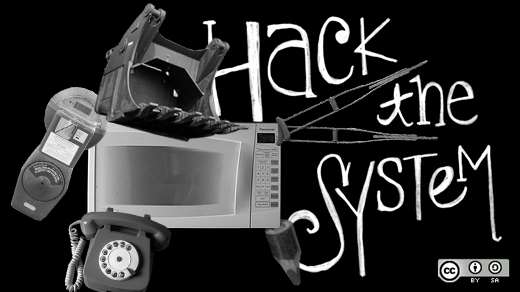James Wallbank is a founder of one of the longest-running hackerspaces in the U.K. Access Space opened in the center of the northern industrial city of Sheffield in 2000 with the goal of being open to all.
Beyond being a place for coding and programming, Access Space refurbishes donated laptops for charitable use. It was also the subject of a recent academic study on barriers to womens' participation in hackerspaces and makerspaces. In this interview, Ikem Nzeribe of Moss Code and I ask Wallbank about his experience running the hackerspace, revealing lessons that all projects looking to support diversity can use for themselves. The hackerspace model of economic self-empowerment could lead to a more diverse tech sector, but Wallbank makes it clear that there are no short cuts. The challenge may be finding enough champions of genuine diversity with the right balance of vision, critical evaluation, and persistence to enable under-represented communities.
Wallbank's new project in Sheffield is Makers, a teaching space for craft workshops, from laser cutting to crocheting. The emphasis is on making things for direct sale in the local economy so that participants are paid for using their new skills.

When you started Access Space, did you aim to increase diversity, or did it just happen?
We very much wanted to include everyone. This was partly political—we felt that everyone should have opportunities—but it was also cultural and cognitive. We figured that a diverse set of participants would create a better collective intelligence.
Sheffield as a city has had significant economic challenges, but it's also part of a wider pattern of social and economic polarization. Sheffield has some of the poorest people in the U.K., and the U.K.'s largest Rolls-Royce dealership. (See the city's maps for the Indices of Multiple Deprivation, an analysis of people's economic, social, health, and opportunity situation).
Do you have any practical tips for making people feel welcome in a hackerspace or makerspace?
We aimed to include skilled, well educated high achievers as well as deprived people. The key is that people with lots of resources bring those resources with them. So a project that has social aims shouldn't marginalize the excluded. The biggest deal was being open consistently; we published all our opening times and stuck to them. Always have someone around to greet people, and try really hard not to judge people before they're involved.
Did you believe that people in Sheffield were underachieving, economically or personally?
A common idea is that digital tech can provide a "hack" to empower people, and I fear that it can't—tech amplifies opportunity, and as an amplifier it will increase inequality. When a new tech gets introduced, it has huge empowerment potential. If you get stuck in right away, then you can use that tech to get ahead. But if you play catch-up, you'll always end up being farmed by the early adopters. Digital literacy is going to help you become a call center worker.
It's important to be involved in whatever the next thing is. There's a short window when the disempowered can use tech to gain advantage, but that window closes quite quickly. Right now, I think the window's still open for digital manufacture. RFID... maybe a bit late. Embedded electronics... maybe. Drones? The window's almost closed. Apps? Sorry, you're too late. We should look at what's coming next and try to mobilize that tech and get it into the hands of the disempowered really early. And we need to be critical of the hype cycle.
What is an example of how that window of opportunity closes?
In 2000, one of the participants (an unemployed artist) at Access Space started to learn about web design. Two weeks later he'd read a book on HTML and made his first web pages. Now he employs six people in his own web design business. If you want to get into web design now, two years of reading will not be enough. Even when you have become expert, 95% of your market is gone to free services like Facebook.
We have to look for the things that are still rough around the edges. That might be brilliant or might be VRML. And most of them won't work, but some of them will. If there are people who are activists, workers for social change, or simply entrepreneurs in their own right, they need to be involved with the technologies that haven't yet been normalized and commodified. The tech industry is constantly encouraging people to pitch! I'm thinking: Stop pitching, start bootstrapping.
What's the role of open source in bootstrapping projects like these?
The point of bootstrapping is that you can make progress incrementally without needing to ask permission. Open source is critical because you own the skills you learn. Even if your idea fails, by using open source tech you've learned skills you can redeploy in your next idea.
Simply from a user perspective, open source is an investment. Proprietary software is an expenditure. And you're always capacity-building when you use open source. But open source is also an amplifier of advantage, so by itself it will not change the world for the better. We have to ensure that those on the outside understand how tech that may apparently give them new opportunities may also be tech that is farming them. We can't oppose technology, but we can look at it carefully and see how we can use it for good.
Is there a way to turn this into a positive?
Open source is only part of the answer. A real dedication to getting skills to people on the outside is also key. Catch-up tech education for the excluded is not enough. There needs to be real, critical evaluation of what's going on.
I think that tech skills are actually quite easy. The hard thing is being able to take a step back, see what's really going on in the context you're in, stay positive, and act! If we, as open source advocates, can help techy folks to see that open source is necessary, but not sufficient to making things better, that'll help.
For a community facing serious social and economic challenges, are there limits to what software can achieve?
One of the mistakes we can make is to think that every situation is hackable. For instance, you fall out of a plane. You've no parachute. But you can use any software you like to hack a solution! Whether you use proprietary or open source tools won't make any difference to your rate of descent.
Hackability is something to do with amplification of your effort, but it also has to do with the vulnerability of the system. Only some types of situations are hackable; of the character that they have dominoes lined up, ready to push over, or teetering snow, ready to cause an avalanche.
Many socially positive interventions that hope they're going to use technology to empower fall for the fallacy of presuming that there is a magic key or a cheat code that'll unlock social inclusion. The effort you need to put in to make things better is directly proportional to the size of the problems; there is no digital lever. I still see people online talking about some special software or new social network, cryptocurrency, open data, or whatever, as if this points the way to a social hack that will make things better. But what if the context isn't in a hackable state?
Is there a practical answer to the economic polarization of communities?
We need to learn how to build, not just hack. I think there's lots of potential in the superlocal—the opposite of the global impact dialog talked by existing tech companies. Slow, incremental progress using the right approaches will start to turn the tide. The trouble is, funders like professional, uplifting results, not small-scale incremental improvements. They are often searching for the "rags to riches" story, not the more realistic "rags to reasonable clothes" story.
What we're seeing right now is that the factors that promote social divergence have huge momentum. Only on vanishingly small scales are they vulnerable to a hack. Isn't it interesting how our mass media are absolutely hypnotized by those vanishingly small possibilities? I'm interested in seeing if we can steer technology adoption in such a way that we move from a lottery economy to a building economy, creating a far wider community of digital tradespeople who may not become millionaires, but can at least thrive on a more modest level.
If you could recommend one approach for enabling people, what would it be?
For technology to be a positive force for society (and the planet), open source and open standards and protocols are essential, but not sufficient. It's wrong to assume that just because you publish with an open license, somehow everything is automatically going to be better. There's far more work to do in terms of education, opportunities, awareness, and spreading know-how. If there's just one thing we need to concentrate on, it's giving naive technology users some tools to critically evaluate the software, systems, and networks they engage with.







Comments are closed.